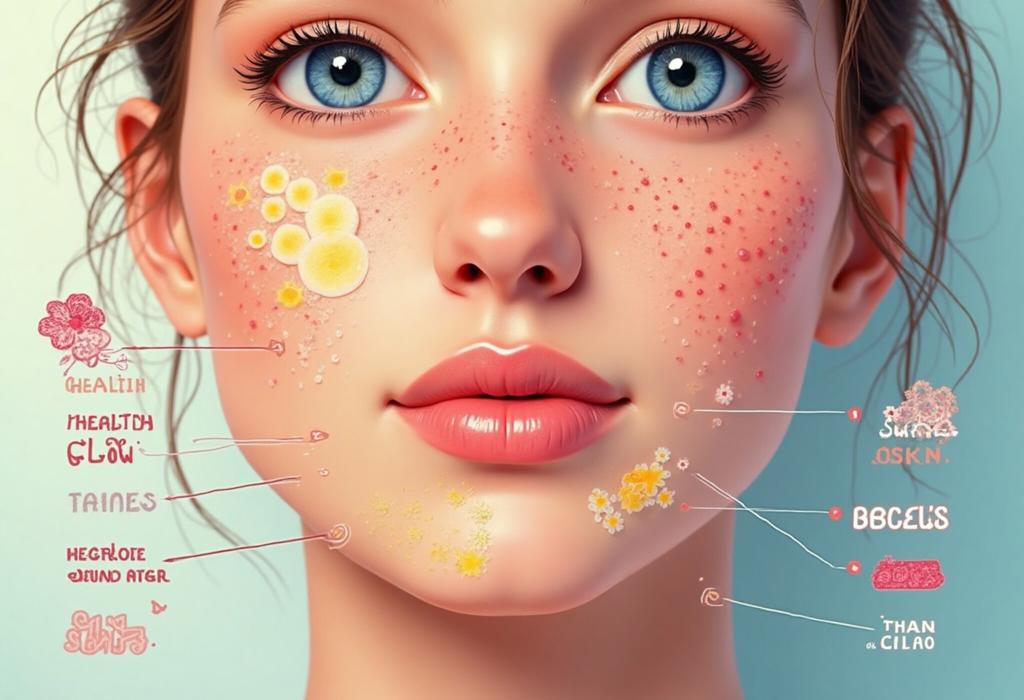For more details on this content, please review the step-by-step guide and frequently asked questions.
What Your Skin Can Reveal About Your Health

Step-by-Step Guide
Introduction to Skin Health
The skin is the body's largest organ, serving as the first line of defense against pathogens and environmental toxins. Its appearance can provide insights into your internal health, reflecting conditions such as dehydration, nutritional deficiencies, and systemic diseases.
Color Changes and What They Indicate
Variations in skin color can indicate underlying health issues. For instance, yellowish skin may suggest liver problems, while a bluish tinge (cyanosis) may reflect oxygen deficiency. Observing your skin’s hue and tint can provide early warnings about possible health concerns.
Texture and Its Health Implications
The texture of your skin can reveal a lot about your health. Smooth skin may indicate sufficient hydration or a healthy diet, while dry, rough skin could point to dehydration or certain skin conditions like eczema. Pay attention to areas of irritation and flakiness as they can indicate allergies or deficiencies.
Acne and Breakouts
Acne cannot only be a sign of puberty but can also indicate hormonal imbalances, stress levels, or underlying conditions like PCOS. Keeping a journal of your skin’s condition alongside your diet and lifestyle choices can help identify triggering factors leading to breakouts.
The Role of Hydration
Your skin’s hydration level is essential for its function and appearance. Lack of water can lead to dry, dull skin. Monitor your water intake and maintain proper hydration to ensure your skin remains glowing and healthy.
Nutrition and Skin Health
The foods you eat significantly influence skin health. A diet rich in vitamins A, C, E, and omega-3 fatty acids can enhance skin condition. Conversely, excessive sugar and processed foods may exacerbate skin issues such as acne and aging. By adjusting your nutrition, you can improve skin appearance.
Skin Rashes and Allergies
Rashes, hives, or persistent itchiness may indicate allergies or chronic skin conditions like dermatitis or psoriasis. Keep track of new products, foods, and environmental factors introduced in your life to help identify potential allergens.
Freckles, Moles, and Skin Changes
Changes in moles or the appearance of new freckles should be monitored. Sudden changes in size, shape, or color can be a sign of melanoma or other skin cancers. Regular skin checks can help detect skin anomalies early.
Sun Exposure and Its Effects
Overexposure to sun can lead to premature aging and increase the risk for skin cancers. Protecting your skin with sunscreen, clothing, and seeking shade can enhance your skin health while preventing future health issues.
Stress and Its Impact on Skin
Chronic stress can lead to skin issues such as acne, hives, or psoriasis flare-ups. Finding effective stress management techniques such as exercise, mindfulness, or hobbies can greatly benefit your skin health.
Sleep and Skin Regeneration
Sleep plays a vital role in skin health. During sleep, the body repairs and regenerates skin cells. Aim for 7-9 hours of quality sleep per night to promote healthy skin and reduce the appearance of dark circles and puffiness.
When to Seek Medical Advice
If you notice persistent changes in your skin that do not improve with lifestyle changes, it’s important to seek professional medical advice. Dermatologists can perform necessary examinations and testing to diagnose and treat skin conditions effectively.
Maintaining a Healthy Skin Routine
Building a daily skincare routine that incorporates cleansing, exfoliating, moisturizing, and sun protection can significantly improve skin health. Customize your routine based on skin type and concerns.
Natural Remedies and Skin Care
Incorporating natural remedies such as aloe vera, honey, and coconut oil can enhance skin health. They can hydrate, soothe, and help treat various skin conditions naturally.
Conclusion
Your skin serves as a reflection of your overall health status. By being mindful of skin changes and adopting a healthy lifestyle, you can maintain not only beautiful skin but also enhance your overall well-being.








